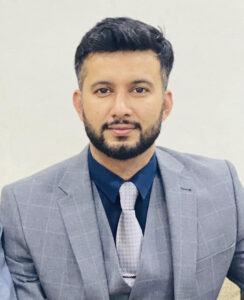
Advancing Smart Agriculture with Mobile-Based Maize Leaf Disease Detection
Digital and precision agriculture technologies are rapidly evolving after the introduction of fast computing. These advanced computers in combination with artificial intelligence techniques have made significant technological advances in detection and classification of plant diseases especially in maize crops. As a staple diet in many countries, Maize has global significance, and ensuring its continuous production and protection from diseases and pests is vital to ensure food security. Pakistan is producing 9.5 million tons of maize each year and ranks at 14th place in global maize production. Keeping in mind the importance of timely management of diseases, a groundbreaking study introduced a mobile-based system for maize plant leaf disease detection and classification using deep learning by the team led by Dr. Muhammad Naveed Tahir, Associate Professor of Agronomy and Principal Investigator at the Center of Precision Agriculture (C4PA), Arid Agriculture University Rawalpindi. This mobile phone application is offering farmers an innovative tool to manage maize diseases effectively.
Challenges in Maize Diseases Detection
Maize, produced globally in almost every continent, is prone to many pests and diseases attacks that could significantly reduce grain yield. Blight, Leaf Spot, Sugarcane Mosaic Virus (SCMV) are among the most common Maize diseases. Farmers are relying on their judgment in identifying these diseases by manually inspecting the crop. Manual identification is not only a time-consuming and tedious exercise but also more susceptible to errors especially in the early stages of crop cycle.
How Deep Learning Play Significant Role in Disease Detection
Artificial intelligence is playing pivotal role in helping scientists to develop and deploy advance techniques to facilitate growers in better and efficient farm management. Image recognition and analysis using deep learning, a branch of artificial intelligence, is being widely adopted among scientists working in various cropping systems. Crop images can be used to develop and train deep learning based models which relies on various characteristics of plants in order to accurately identify maize diseases. Dr. Naveed’s team explored several versions of deep learning model, you only live once (YOLO), in their study1 published in Frontiers in Crop Sciences to detect and classify maize leaf diseases.
Why YOLOv8n Stands Out
The results of the study showed that YOLOv8n produced remarkable prediction accuracy of 99.04% among the several YOLO based deep learning models tested. The YOLOv8n model could also identify the small localized effected area by the diseases tested i.e. blight, leaf spot, and SCMV. The robustness and accuracy of YOLOv8n highlights its potential role developing deep learning based solution for real-time disease detection in different cropping systems.
Mobile Application for Real-Time Disease Detection
One of the exciting outcomes of this study was the converting of this deep learning model for disease identification and classification in Maize crop into a mobile application. This application allows farmers to capture or upload maize images. These images are then processed through the developed algorithm to assess crop health within seconds. One of the most exciting aspects of this research is the integration of the deep learning models into a mobile application. It also minimizes the potential errors in human judgement to identify these diseases in early stages of crop cycle. The game changer application can help farmers in timely and effective management of maize crop.
The Future of Digital Agriculture The developed mobile application laid the foundation to add more crops and disease databases in the system to make it a universal application for Maize crop around the globe. Famers can rely on this application in future to timely control potential harmful impacts of various diseases which would ultimately result in better yields and farm profitability. We at the C4PA are working on the development of these innovative solutions and providing real world practical solutions to farming community across the globe. We firmly believe that precision and digital agriculture technologies will further revolutionize the way we manage our crops.Dr. Naveed’s team is now working on development of these deep learning-based model for Unmanned Ariel Vehicles (UAV) to monitor crops in fast and efficient manner.

This Article is contributed by:
